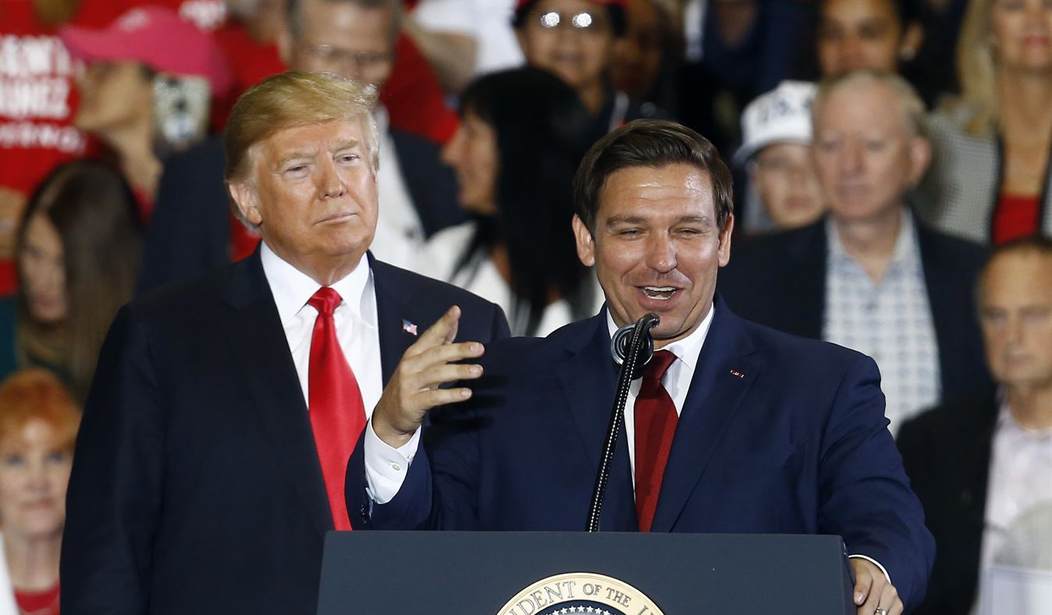Florida Governor Ron DeSantis holds a narrow lead over President Joe Biden in the battleground states of Arizona and Pennsylvania and would likely outperform Donald Trump as a candidate in a hypothetical 2024 presidential match-up.
According to a recent poll conducted by the GOP firm Public Opinion Strategies, DeSantis leads Biden 45 percent to 42 percent, while Trump trails him by 42 percent to 46 percent in Pennsylvania. Meanwhile, the survey similarly found that in Arizona, DeSantis led Biden 48 percent to 42 percent, compared with Trump who trailed the leader 44 percent to 45 percent.
The survey polled 500 registered voters from Arizona and Pennsylvania, with the leads in both sets of numbers falling within the poll’s 4.4-percentage-point margin of error. However, Trump allies may be concerned by his underlying popularity in both states.
In Pennsylvania, 56 percent of voters have an unfavorable view of him, while only 40 percent hold a favorable opinion. In Arizona, 58 percent of voters have an unfavorable view of him, compared to just 40 percent who feel the opposite.
The results suggest that more than half the electorate in these battlegrounds have already made up their minds and are unlikely to vote for Trump in the next election. A majority of voters in both states, 56 percent in Pennsylvania and 55 percent in Arizona, said that they are unlikely to vote for him.
The numbers will likely stir further debate about the electability of each candidate, with DeSantis supporters arguing that the American public is ready to move on from Trump. Other Republican politicians to have already declared include entrepreneur Vivek Ramaswamy. South Carolina Senator Tim Scott as well as the state’s former Governor Nikki Haley.
However, other polling figures for the Republican primary indicate that despite the alleged fatigue of the American public, Trump’s supporters are not ready to move on, while DeSantis remains his only credible challenger.
FiveThirtyEight reported last week:
[The data] shows former President Donald Trump receiving 49.3 percent of the national vote and Florida Gov. Ron DeSantis (who has not officially entered the race) receiving 26.2 percent. Former Vice President Mike Pence, another potential candidate, is at 5.8 percent, while declared candidate and former UN Ambassador Nikki Haley is at 4.3 percent.
Some people will say that national primary polls aren’t important because there is no national primary (just a series of state-by-state contests). Others will tell you it’s too early — more than nine months away from the Iowa caucuses — to put much stock in polls. But we think there’s value in a national polling average, even (especially?) this early: According to our research, national primary polls conducted the year before the election are reasonably predictive of the eventual nominee.
Specifically, when candidates are polling above about 30 percent nationally, they have historically had a decent chance of becoming the nominee. That chance increases the higher their polling numbers are. On the flip side, though, candidates with polling below around 20 percent have been pretty unlikely to win, and those polling below 10 percent are usually doomed.
Despite the hundreds of data sets published about DeSantis’s chances of taking the White House, the Florida Governor has yet to announce his candidacy for the GOP nomination. Other potential candidates who have yet to declare include former Vice President Mike Pence and Virginia Governor Glenn Youngkin, while former Secretary of State Mike Pompeo has ruled himself out of the race.















Join the conversation as a VIP Member